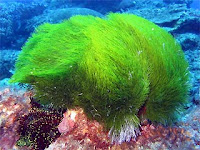Two important groups of plants in the coral reef are seaweeds, also known as macroscopic algae, and sea grasses. Both types of organisms are autotrophs. Along with the one-celled autotrophs, these marine plants support the food chains in the reef.
Compared to other marine ecosystems, the number and diversity of plants in coral reefs are relatively low. Small plant populations may be due to the fact that competition for space on reefs is very high, and corals often outcompete plants for the best reef locations. In addition, many of the reef animals are grazers, and they may hold down the size of seaweed populations; in experiments where grazers are removed from an area of reef, plant density increases dramatically. Another reason may be that coral reef waters are low in nutrients needed to support abundant plant life. Despite all of these hurdles, several species of green, red, and brown macroalgae, as well as grasses, flourish in the reef environment.

